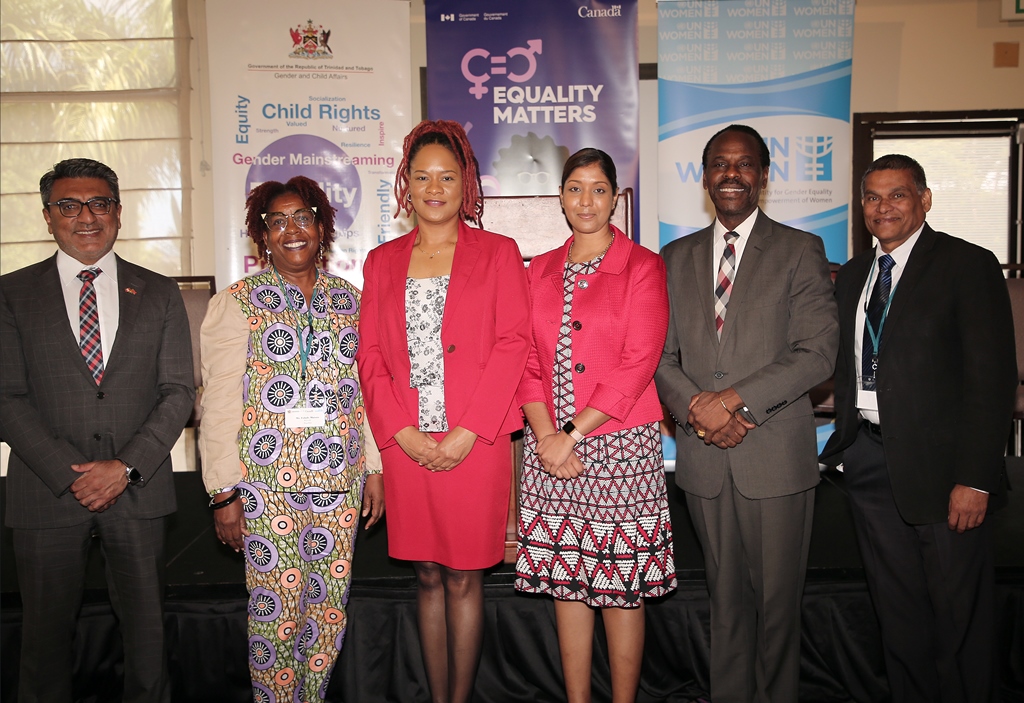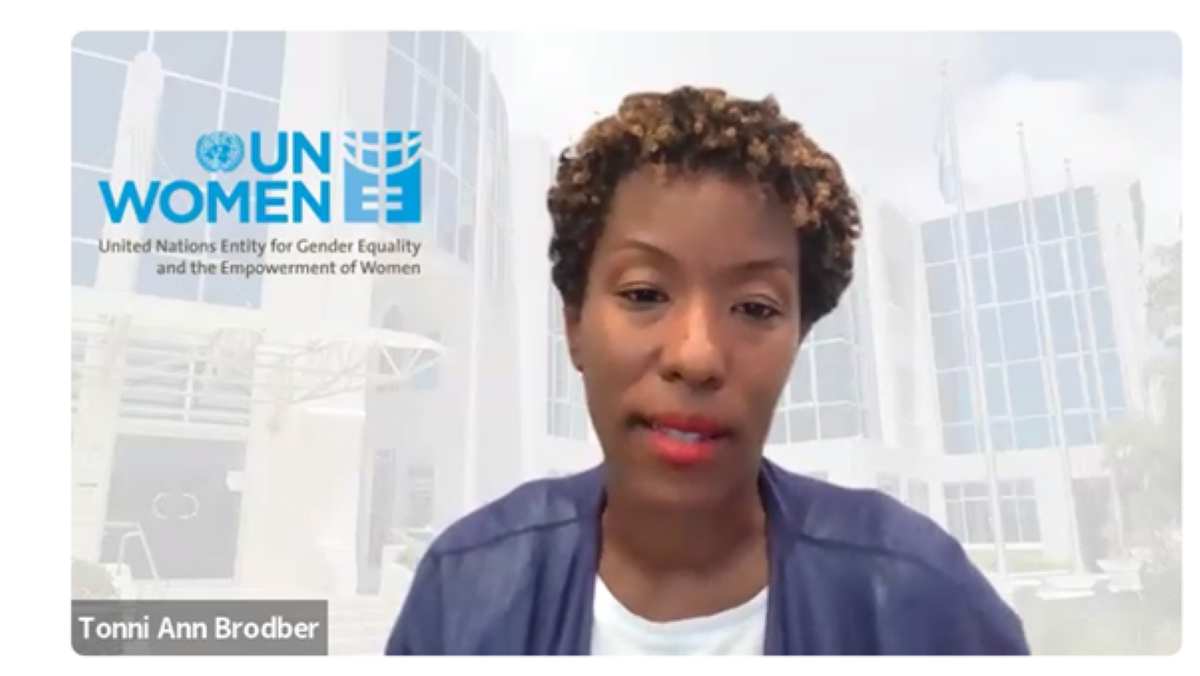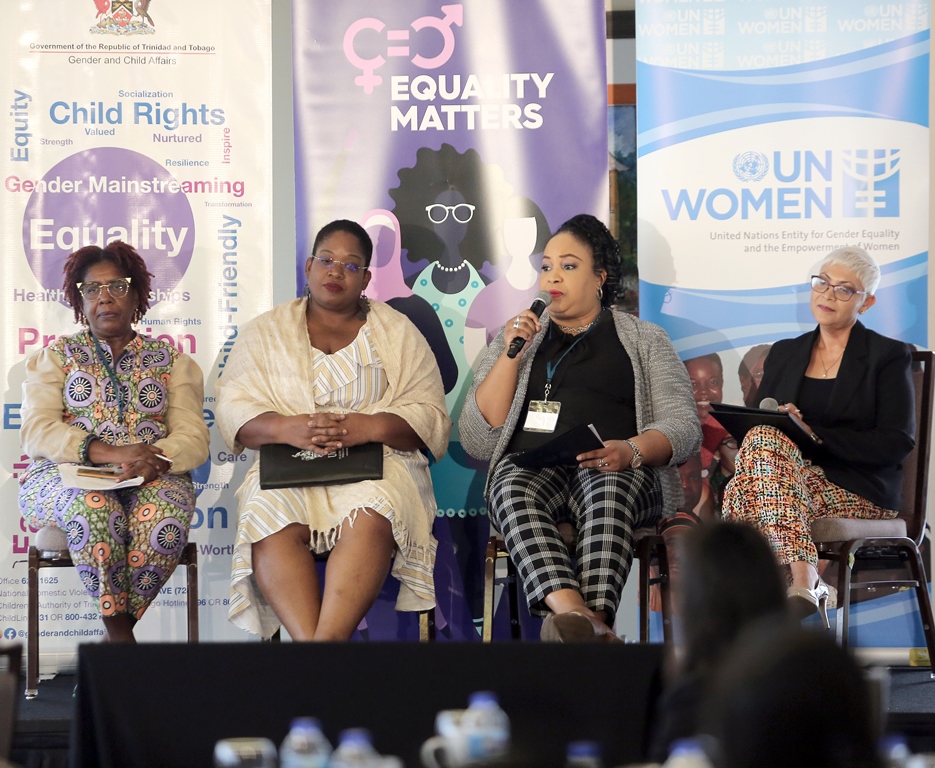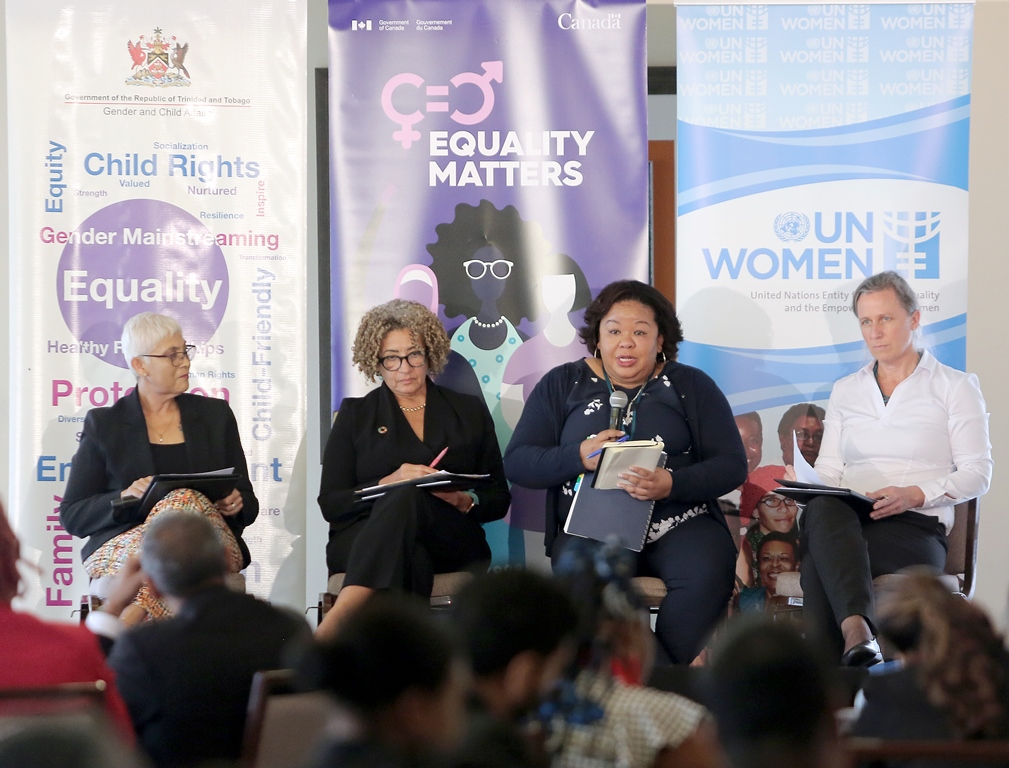Trinidad and Tobago to Develop Women, Peace and Security National Action Plan
Date:

(from left: His Excellency Arif Keshani, High Commissioner of Canada to Trinidad and Tobago; Ms. Folade Mutota, Executive Director, WINAD; The Honourable Ayanna Webster-Roy, Minister in the Office of the Prime Minister with responsibility for Gender and Child Affairs; Ms. Je’nille Maraj, Planning and Coordination Specialist, UN Women MCO Caribbean; The Honourable Fitzgerald Hinds, Minister of National Security; and Permanent Secretary (Ag.) Vijay Gangapersad) | UN Women Photos/Abraham Diaz
Port of Spain, Trinidad and Tobago: Trinidad and Tobago is committed to implementing the Women, Peace and Security (WPS) Agenda as a way to address national security issues. Too often the rights of women and girls, as well as their insights and experiences, have been neglected and overlooked when responding to conflicts including crime, violence and other security challenges. The establishment of a National Action Plan will allow for women to be valued for their role as equal partners in the reduction of all forms of violence.
This was the consensus at the National Workshop towards the Implementation of the Women, Peace and Security Agenda, jointly hosted by the Office of the Prime Minister’s Gender and Child Affairs Division, UN Women and the Government of Canada. Participants included stakeholders from the civil society, justice sector, defence force and academia who are involved in peace building and crime reduction strategies.
United Nations Security Council Resolution (UNSCR) 1325 adopted in 2000 outlined the foundations of what is now referred to as the Women, Peace and Security (WPS) Agenda. Since the adoption of UNSCR 1325 over two decades ago, there have been increased efforts around the world to ensure women’s essential contributions to peace and security are recognised. There are now over 100 National Action Plans on Women, Peace and Security in countries in almost every region of the world, except for the Caribbean.
This initiative moves forward the commitments emphasised by the Honourable Ayanna Webster-Roy, Minister with responsibility for Gender and Child Affairs at the UN Security Council in March 2023. In April 2023, Trinidad and Tobago took a decision to become the first member of the WPS Focal Points Network from the Caribbean Region, and earlier this month (June 6th -9th), a Ministerial Delegation participated in the WPS Focal Points meeting in Washington DC. In line with CARICOM’s recent Regional Symposium focused on ‘Violence as a Public Health Issue’, Trinidad and Tobago is working to ensure the public health initiative responds to the concerns of both women and men, including those who are marginalized or face specific challenges in addition to addressing gender inequalities. Minister Webster-Roy encouraged participants to “use the people’s trust in us as responsible leaders to motivate our daily decisions as policy makers and practitioners” in propelling a renewed narrative on the evolving role of women in securing the nation. The Honourable Fitzgerald Hinds, Minister of National Security, in supporting the WPS Agenda, called for the treatment of crime and violence, including gang activity through a public health approach.

Representative UN Women Multi-Country Office – Caribbean, Ms. Tonni Brodber said: “Trinidad and Tobago is not a country in active conflict, however like other countries in the region, the country is experiencing high rates of armed violence, resulting in homicides, femicide, gang activity, gender-based violence and other forms of criminality. This state of Non-Peace is a cancer to social cohesion and communities. An obvious form of gender-based insecurity is the continued prevalence of different forms of violence against women and girls (VAWG), with 44% of Trinbagonian women having experienced physical and/or sexual intimate partner violence at least once in their lifetime. As we continue this work we see the connections between persons willing to choose violence in their relationships and their communities, as violence becomes normalised. Congratulations to the Government of Trinidad and Tobago for their leadership on this area which will address strengthening prevention as well as response.”
His Excellency, Arif Keshani, Canadian High Commissioner indicated that “the Women Peace and Security Agenda is a significant priority for the Government of Canada and we applaud the efforts of all those involved who have come together to chart the next steps for Trinidad and Tobago on Women, Peace and Security. While we know that everyone is affected by insecurity, women, men, girls and boys often experience insecurity and violence differently. And it should be underscored that Women, Peace and Security is not about an idea that women are inherently more peaceful than men. It is the idea that the best policies result when there is broad examination of issues and solutions and in particular, the inclusion of all groups that are affected. Women and girls should not only be viewed as recipients of aid or protection, but important contributors to decision making at all levels if we want to have enduring, effective solutions to insecurity.”

After the high-level opening ceremony, two panels, including representatives from the Trinidad & Tobago Police Force, judiciary, academia and civil society highlighted key issues. The afternoon involved smaller group discussion among members of the defence forces, police, judiciary, government agencies, academia, and civil society to identify and discuss possible steps forward towards implementing the Women, Peace and Security Agenda in Trinidad & Tobago. The workshop delved into the understanding and analysis of security risks and entry points to address these using an intersectional multi-sectoral and gendered perspective. The participatory and inclusive process is focused on long-term comprehensive programming that addresses the root causes of insecurity.
